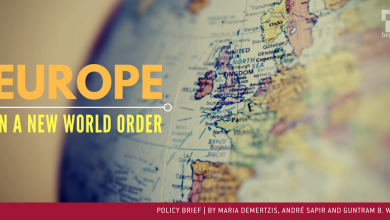A shortened version of this opinion piece has been published by the Financial Times.
Germany has voted – and the result has been a shock to Germans and to Europe. The AfD – an extremely right wing, and in part neo-nazi, party – has successfully entered the Bundestag. As a German and European, that is the most worrying part of Sunday’s result for me. This shift will pull Germany to the right, and not only because the AfD will gain a platform for its unpleasant views. Chancellor Merkel will also find it increasingly difficult to control the rank and file of her own party, the CDU, on issues like migration and terrorism. After all, many CDU members and parliamentarians are more solidly conservative than Merkel’s centrist chancellorship might imply. The AfD will not be governing Germany but it has clearly weakened Merkel and her party. But they will not be the main opposition, so long as the social democrats, the SPD, stick to their pledge to take some time in opposition.
European eyes are now on the coalition negotiations. Many worry that an unstable coalition, or too much power to the liberal but increasingly euro-critical FDP, could be dangerous for the EU and the euro area. However, the most likely government, a so-called Jamaica coalition of CDU/CSU, FDP and the Greens, could actually bear some good news for the Eurozone.
The main reason is that a Jamaica coalition would maintain European economic policies largely indistinguishable from the current government, while possibly bringing substantial changes to domestic policy that would support growth and investment in Germany and abroad.
True, the FDP has announced that it would like to see countries held more strictly to the stability and growth pact. And this pact has, in the eyes of many commentators, been the cause of Europe’s recession. But the FDP’s position is exactly the same as that of Wolfgang Schäuble, Germany’s departing finance minister. Schäuble has been a fiscal hawk at home and in Europe, and is known to be one of the fiercest critics of the European Commission’s flexible approach to budget rules. Things are unlikely to change, even if the FDP takes over the finance ministry.
The FDP has also been sceptical about the idea of a large euro-area budget, which euro-federalists hoped to create during a short “window of opportunity” after the German election. But this large budget was never a realistic proposition in the first place, while a small one could have been politically possible but economically irrelevant. Even with a CDU-SPD grand coalition governing with a large majority, Germany was not willing to provide ample tax funding to help ailing euro-area countries. In fact, a majority of Germans are opposed to transfers and doubt the effectiveness of a common budget in managing a euro-area fiscal stance.
Regarding debt relief for Greece, the FDP have declared that this is only possible if Greece leaves the Euro. But so has Wolfgang Schäuble. So, once again, views on the euro area will stay the same, even with the FDP in government.
A Jamaica coalition would not be a Eurosceptic government. All three parties are EU supporters, and the Greens are especially pro-European. A Jamaican Germany would be open to compromises with France and I would expect gradual progress towards greater fiscal integration – but only if it is combined with greater budgetary responsibility from member states. A Jamaica coalition would also be open to many of the points French President Emmanuel Macron has just raised, such as greater defence and security cooperation, a European migration policy and enhanced collaboration in research and university exchanges. It could even be possible to agree on a transnational list for the next European Parliament to strengthen European democracy, an idea which pleases both the FDP and the Greens. None of this will be easy, but President Macron is right to demand progress and compromise.
Nevertheless, the real benefit of Jamaica coalition for Europe might actually be in German domestic economic policy. Both the Greens and the FDP have been campaigning strongly on issues that would transform the German economy, such as upgrading the digital strategy, advancing climate mitigation, liberalising the services sector, improving the education system, increasing female labour force participation and cutting taxes to boost investment.
A Jamaica coalition could thus be a catalyst for significant economic reforms that will trigger growth and investment in Germany. This would support demand in the wider euro area and reduce Germany’s large current account surplus. A Jamaica government could be a big change, compared to the inaction of the current government on all domestic economic policy challenges.
The key to a Jamaica coalition’s success will be to distribute responsibilities so that each party’s key campaign promises will be turned into policies. That would mean empowering the FDP to liberalise the services sector, promoting digitalisation and cutting taxes, while putting the Greens in charge of climate, environmental and gender policy. Meanwhile, Merkel’s party would need to focus on migration and internal security and pursue a conservative course there to take the wind out of the AfD’s sails. However, despite the opportunities, there is a substantial risk that views within a Jamaica coalition are so different that any initiative will be blocked by the partners. Merkel will need all her political skill to hold the coalition together and drive change in Germany and Europe.

